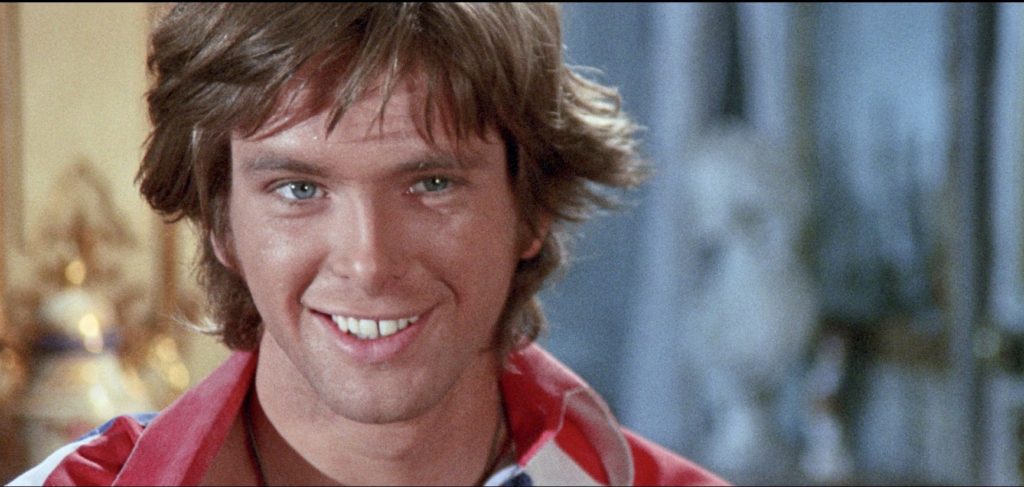A Retrospective on Key Films
Ray Lovelock, born on June 19, 1950, was an actor whose career spanned over four decades, leaving an indelible mark on the Italian film industry. A versatile performer, Lovelock dabbled in numerous genres, but his legacy is particularly tied to Italian genre cinema, especially poliziotteschi (crime films) and gialli (Italian thrillers). Throughout the 1970s, Lovelock appeared in a string of cult classics that showcased his ability to embody charm, intensity, and moral complexity.
In this article, we look back at four iconic films that defined his career and solidified his status as one of the key figures in Italian genre cinema: Uomini si nasce poliziotti si muore (1976), Play Motel (1979), La settima donna (1978), and Pronto ad uccidere (1976).
1. Uomini si nasce poliziotti si muore (1976)
Directed by Ruggero Deodato, Uomini si nasce poliziotti si muore (also known as Live Like a Cop, Die Like a Man) is one of the most brutal entries in the poliziotteschi genre. The film follows two violent and morally ambiguous police officers, Alfredo and Antonio, as they work undercover in a special anti-crime unit in Rome.
Lovelock plays one of these officers, embodying the role of a lawman whose methods often blur the lines between justice and vigilantism. His chemistry with co-star Marc Porel elevates the film, as both men engage in reckless and often sadistic acts in pursuit of criminals. The film’s frenetic pacing, graphic violence, and cynical portrayal of law enforcement make it a standout in the poliziotteschi canon.
Lovelock’s performance as Antonio captures both the cool detachment and raw intensity of a character who sees himself as above the law, making him both charismatic and terrifying.
2. Play Motel (1979)
Play Motel, directed by Mario Gariazzo, is a sleazy giallo that blends mystery, eroticism, and violence in a way that only Italian genre cinema could. The plot revolves around a series of murders connected to a high-end motel used for illicit trysts. Lovelock plays a journalist who, alongside his girlfriend, investigates the murders and uncovers a web of blackmail, corruption, and voyeurism.
The film is a lurid mix of sex and suspense, with Lovelock’s performance standing out as one of the film’s few redeeming qualities. He brings a sense of groundedness and charm to the role, offering a more subdued and intelligent character than the typical heroes of such films. While Play Motel may not be the pinnacle of Lovelock’s career, it is a fascinating example of how he managed to elevate even the most exploitative material with his charisma and screen presence.
3. La settima donna (1978)
Also known as The Last House on the Beach, this film is a grim exploitation thriller directed by Franco Prosperi. La settima donna is a harrowing tale of survival and revenge, in which three criminals, led by Lovelock’s character, take refuge in a convent school, holding a group of nuns and their students hostage.
Lovelock’s portrayal of Aldo, the leader of the gang, is chilling and multi-faceted. While he often played sympathetic or heroic roles, here Lovelock taps into a darker, more menacing side of his talent. His performance as the sadistic criminal is unnerving, yet his ability to inject nuance into the role makes Aldo more than just a one-dimensional villain. The film’s intense violence, particularly against women, is controversial, but Lovelock’s performance is a key reason why La settima donna is remembered as a powerful, albeit disturbing, entry in the Italian rape-revenge subgenre.
4. Pronto ad uccidere (1976)
Pronto ad uccidere (Ready to Kill), directed by Franco Prosperi (not to be confused with the La settima donna director), is another gritty poliziotteschi that exemplifies the tough, no-nonsense crime films of the 1970s. In this film, Lovelock plays a man seeking vengeance against those responsible for framing him in a violent drug-related conspiracy.
As with his other poliziotteschi roles, Lovelock is perfectly suited to the film’s themes of retribution and justice. His portrayal of a wronged man pushed to the brink showcases his ability to handle the emotional weight of a character seeking personal justice, while also delivering the physical intensity required for the film’s numerous action sequences. Though Pronto ad uccidere is less well-known than some of the other films mentioned, it is an essential part of Lovelock’s filmography for fans of the poliziotteschi genre.
Ray Lovelock’s Legacy
Ray Lovelock’s career spanned a wide range of genres, but it is his contributions to the gritty world of Italian genre cinema that remain most memorable. Whether playing morally ambiguous cops, hard-nosed vigilantes, or sadistic criminals, Lovelock had the rare ability to bring complexity and humanity to roles that might have otherwise been one-note. His performances in Uomini si nasce poliziotti si muore, Play Motel, La settima donna, and Pronto ad uccidere illustrate the breadth of his talent and the lasting impact he had on the Italian crime and thriller genres.
In a career defined by intensity, charm, and versatility, Lovelock remains a beloved figure in cult cinema. His work continues to be rediscovered by new generations of fans, ensuring that his legacy as one of Italian genre cinema’s most compelling stars lives on.
Watch the movie on Movieitaly+
Read more articles here!






